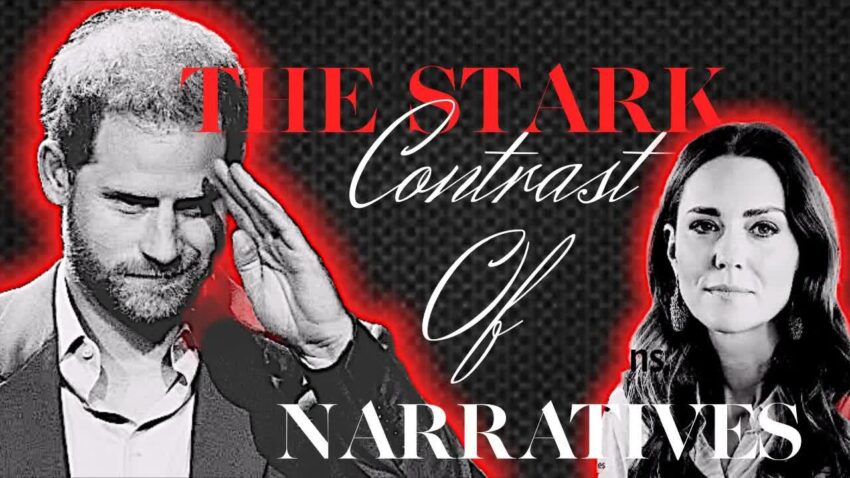Prince Harry’s Authenticity
In the ever-evolving narrative of the British royal family, contrasting stories are emerging around Kate Middleton and Prince Harry.
Recent reactions to Kate’s video about her cancer journey have sparked a heated debate, especially as Harry prepares to launch his new documentary series, Polo.
As public interest grows, so does the conversation surrounding authenticity, privilege, and the responsibilities of royals in addressing societal issues.
Kate Middleton recently shared a video detailing her experience with cancer, aiming to depict resilience and strength.
However, the response has been anything but unanimous.
Critics argue that her portrayal feels more like a calculated public relations maneuver than a genuine attempt to connect with those facing similar battles.
The timing of her announcement, juxtaposed with the harsh realities faced by many cancer patients lacking royal resources, has led to accusations of insensitivity.
Many viewers feel that Kate’s narrative is too self-focused, overlooking the broader conversation about accessibility to cancer treatment.
In a world where numerous individuals are grappling with their health without the privileges afforded to a royal, this perceived self-centeredness raises eyebrows.
One tabloid reporter even controversially referred to other patients as “lesser humans,” highlighting the growing discourse on the double standards within the royal family.
This situation brings to light the stark disparities experienced by countless cancer patients.
While Kate’s story is undeniably compelling, it does not reflect the reality for many who are fighting for their lives amid financial struggles and inadequate support systems.
The contrast between her experience and that of ordinary citizens is troubling and prompts a necessary discussion about advocacy and awareness.
On the flip side, Prince Harry’s upcoming documentary series, Polo, is receiving a warm reception.
This project not only showcases the sport but also emphasizes camaraderie and social responsibility.
Audiences appear to resonate with Harry’s commitment to authentic storytelling, which sets a refreshing tone for the royal narrative.
Public sentiment leans heavily in favor of Harry’s endeavors, as fans express a desire for royals who engage with real-world issues rather than present polished images.
Social media users have pointed out the striking difference in reception between Harry’s documentary and Kate’s recent video, with one remarking that if Harry’s project overshadows Kate’s Hallmark-style presentation, it might indicate a lack of relevance in her approach.
The royal family’s apparent double standards are increasingly scrutinized.
Observers argue that Kate’s video seems more about rehabilitating her image than addressing the pressing concerns of those battling cancer.
As she shares her journey, many perceive her message as less about community support and more about reinforcing her own narrative, leaving a gap in the urgent need for systemic change in cancer patient support.
Real-life accounts from cancer patients reveal the daily challenges they endure—financial burdens, emotional turmoil, and the fight for adequate treatment.
These voices underscore the importance of utilizing one’s platform for advocacy, an aspect critics feel is sorely lacking in Kate’s recent efforts.
In contrast, Prince Harry has consistently leveraged his platform to highlight social issues and engage with communities.
His work, particularly through the Archewell Foundation, demonstrates a dedication to making a meaningful impact rather than simply projecting an idealized image.
This authenticity resonates with the public, who crave narratives that reflect genuine struggles and triumphs.
Harry’s previous documentary, Heart of Invictus, received acclaim for showcasing the inspiring journeys of veterans overcoming adversity through sports.
This project stood in stark contrast to Kate’s self-focused narrative, emphasizing the need for authentic storytelling that connects with real-life challenges.
As conversations continue to unfold, the divide between Kate Middleton’s recent PR efforts and Prince Harry’s authentic storytelling is becoming increasingly pronounced.
Many are now questioning how Kate will respond to the criticisms of her video.
Will she seize the opportunity to advocate for broader issues affecting cancer patients, or will she persist in her pursuit of image rehabilitation?
The public’s appetite for authenticity is evident, and as we anticipate the release of Polo later this year, it serves as a reminder of the importance of genuine connections and advocacy.
The royal family’s role in contemporary society is under scrutiny, and the contrasting approaches of Kate and Harry may shape the future narrative of royalty in the eyes of the public.
What do you think?
Did Kate’s video effectively address her journey, or did it miss the mark in recognizing the struggles of others?
Your thoughts are welcome as this dialogue continues.
